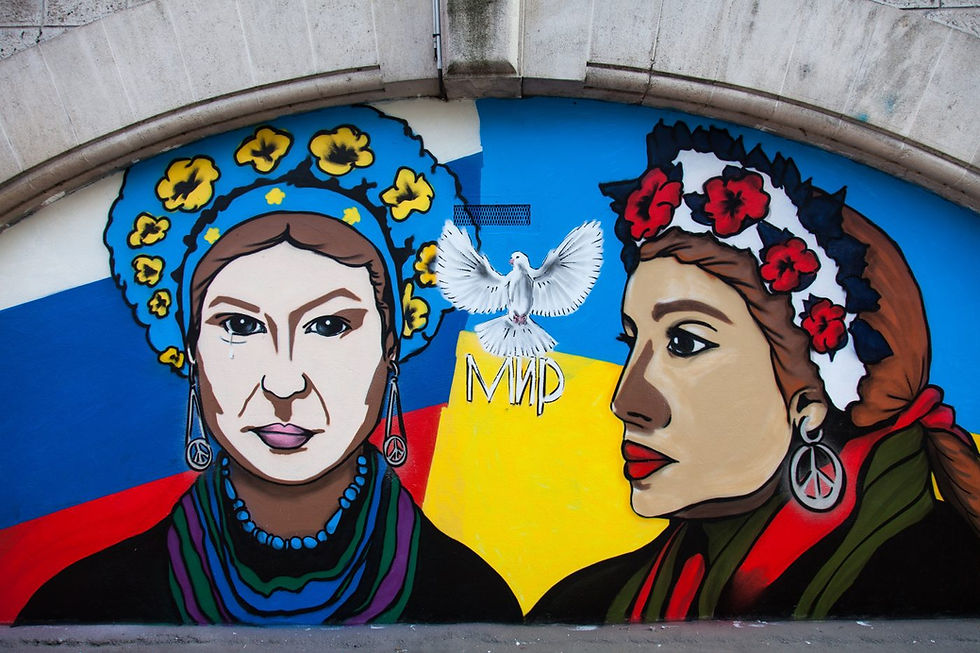Celebrating Russian Propaganda
- Dec 30, 2024
- 4 min read
Russian art shouldn’t be "canceled". Instead, it should be examined for what it reveals about the country’s imperial mission.

A Russian film director I once admired, Kyryl Serebrennikov, spoke at Cannes about the need to support Russian families whose relatives went to war. He called the boycott of Russian culture “intolerable,” arguing that both Ukrainian and Russian families needed help and support.
There’s something deeply troubling about this for any Ukrainian (and perhaps people of every nationality opposed to Russia’s war of aggression.). Of course, Russians are suffering, but should they be the focus of our sympathy? Really? Should “victimized Russia” be in the spotlight, should our stock of sympathy be spent on those who chose to comply with their despotic rulers by sending their loved ones to kill?
And if this is accepted, how far should it extend? To the families of Bin Laden’s comrades, or the beloved of ISIS fighters, the nearest and dearest of Bashar al-Assad’s regime?
Have we over-focused on supposed victims to the point where we remove all human agency? No one is to blame for anything because everyone is a victim? Or perhaps it’s because the world likes to believe that there exists a Russie profonde, a deep and admirable cultural entity separate from the Kremlin, which enriches humanity with its sounds and insights (indeed, there are whole Western university departments devoted, in part, to this theme.)
So how should the world see the culture of a nation that also displays such an unerring ability to immiserate its own lands, those of its neighbors, and even countries as far away as the Middle East and Africa?
Perhaps we can just separate the two things? We could celebrate the rich history of Russian culture — Pushkin, Tchaikovsky, Dostoevsky — and view Russian cinema and contemporary figures as distinct from the actions of the government. According to this view, Russian heritage should remain untarnished by the crimes of the state, and monuments to cultural icons should remain intact. Russian cinema, they say, must be treated as art, not politics, and welcomed in international festivals, free from the burdens of geopolitics.
In other words, culture, especially the pre-Putin culture of the tsarist era, is different. It’s a peaceful thing, and available to all humanity. But this is Western myopia. The classical Russian heritage we revere is deeply intertwined with imperialism. It often glorified the Russian Empire, depicting its expansive power and the subjugation of other peoples. Later came the Soviet era, where culture served as a powerful tool of the state propaganda that violently suppressed ethnic minorities and nearby states.
Today, any division of Russian art into state-controlled and the “anti-state” is very welcome in the West. Yet, even in its supposed detachment from politics, much of it still carries subtle but powerful messages that align with the needs of the Russian state. This is not an accident. Russian state-controlled media and cultural institutions carefully shape how their art is presented to the outside world, ensuring it serves the broader narrative supporting Russian power.
This dynamic was especially evident this year when the Venice International Film Festival screened Russians at War. Produced by a former Russia Today anchor, the film depicts Russian soldiers and downplays the atrocities committed by Russian forces in Ukraine. Ukraine’s invaders were “absolutely ordinary guys with families, with a sense of humor,” the director said, denying the Kremlin had guided her.
Funded by the Cannes Media Fund and filmed while the director was embedded with the Russian military — something impossible in Russia without unofficial state approval — the Venice screening risked normalizing Russian aggression and perpetuating imperial myths.
This example highlights the true nature of contemporary Russian culture even when it is “in exile.” Modern Russian cinema, no matter how aesthetically pleasing and “brave,” too often serves to obscure Russia’s aggression, providing a sanitized version of reality.
To embrace these films without question is to cast into shadow the experiences of millions whose histories have been silenced by Russia.
This is not to say that Russian art should be “canceled.” Instead, it should be critically scrutinized — analyzed like evidence in court, studied by researchers, or dissected under a microscope. We must ask ourselves: What stories are being told? Whose voices are missing, and why? What historical and political context is being ignored?
I know it’s tiring to watch a movie this way, instead of just enjoying it. But without this critical engagement, celebrating Russian art risks complicity in sustaining ideologies that enable war crimes, imperial ambitions, and the silencing of marginalized voices — as it always has.
As we confront the devastation caused by Russia’s invasion of Ukraine, it is well worth ensuring cultural consumption doesn’t inadvertently become a route for imperial narratives that fuel its aggression. Russian art must be seen in the context of the state that produces it, whether for domestic use or for export.
By Lera Burlakova. Lera Burlakova is a Democracy Fellow at the Center for European Policy Analysis (CEPA). She is a Ukrainian journalist and former soldier who served as an infantrywoman from 2014-2017 after joining up following the Russian invasion of Crimea. Her war diary ‘Life P.S., received the UN Women in Arts award in 2021. She lives in Kyiv and works as the Media Officer for the new Amnesty International Ukraine team. Article and pictures first time published on CEPA web page. Prepared for publication by volunteers from the Res Publica - The Center for Civil Resistance.




Comments